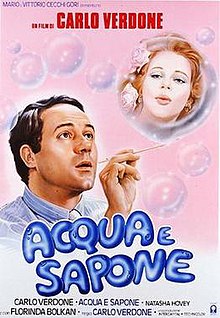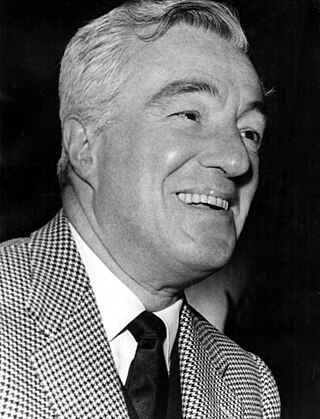
Vittorio De Sica was an Italian film director and actor, a leading figure in the neorealist movement.

Alberto Sordi was an Italian actor, comedian, voice dubber, director, singer, composer and screenwriter.

La Piovra is an Italian television drama series about the Mafia. The series was directed by various directors who each worked on different seasons, including Damiano Damiani, Florestano Vancini, Luigi Perelli, and Giacomo Battiato . The music was written by Riz Ortolani, Ennio Morricone, and by Paolo Buonvino.

I vitelloni is a 1953 Italian comedy drama film directed by Federico Fellini from a screenplay written by himself, Ennio Flaiano and Tullio Pinelli. It stars Franco Interlenghi, Alberto Sordi, Franco Fabrizi, Leopoldo Trieste, and Riccardo Fellini as five young Italian men at crucial turning points in their small town lives. Recognized as a pivotal work in the director's artistic evolution, the film has distinct autobiographical elements that mirror important societal changes in 1950s Italy.

Massimo Ranieri is an Italian singer, actor, television presenter and theatre director.

We All Loved Each Other So Much is a 1974 Italian comedy-drama film directed by Ettore Scola, who co-wrote the screenplay with screenwriting duo Age & Scarpelli. It stars Nino Manfredi, Vittorio Gassman, Stefania Sandrelli, Stefano Satta Flores, Giovanna Ralli and Aldo Fabrizi. Widely considered one of the best films by Scola, and a notable example of the commedia all'italiana, it was dedicated to Italian director Vittorio De Sica. In 2008, the film was included on the Italian Ministry of Cultural Heritage's 100 Italian films to be saved, a list of 100 films that "have changed the collective memory of the country between 1942 and 1978."

Giovanna Ralli,, is an Italian stage, film, and television actress.

Commedia all'italiana, or Italian-style comedy, is an Italian film genre born in Italy in the 1950s and developed in the 1960s and 1970s. It is widely considered to have started with Mario Monicelli's Big Deal on Madonna Street in 1958, and derives its name from the title of Pietro Germi's Divorce Italian Style (1961). According to most of the critics, La Terrazza (1980) by Ettore Scola is the last work considered part of the commedia all'italiana.

Intergirl is a 1989 Soviet-Sweden drama film. It is set in Leningrad in the time of perestroika during the 1980s. The film was the most popular Soviet film in 1989 and made a star of leading actress Elena Yakovleva.
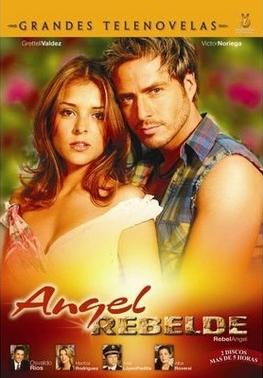
Ángel Rebelde is a 2004 Miami, Florida-based telenovela produced by Fonovideo Productions which aired first on Venevisión in Venezuela. Mexican actors Grettel Valdez and Victor Noriega star as the main protagonists while Maritza Rodríguez and Ismael La Rosa star as the main antagonists. The telenovela aired on Univision from February 2 to December 6, 2004. It recently aired on Venevisión Plus in 2012.
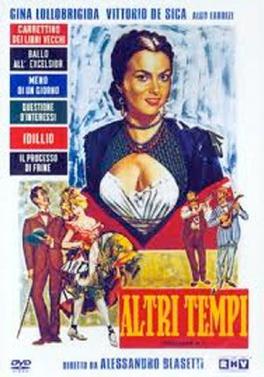
In Olden Days is a 1952 Italian comedy drama anthology film directed by Alessandro Blasetti and featuring an ensemble cast that included Gina Lollobrigida, Amedeo Nazzari, Vittorio De Sica, Elisa Cegani, Barbara Florian, Aldo Fabrizi, Andrea Checchi and Alba Arnova. It was shot at the Cinecittà Studios in Rome. The film's sets were designed by the art directors Dario Cecchi and Veniero Colasanti. It is also known as Times Gone By and Infidelity.
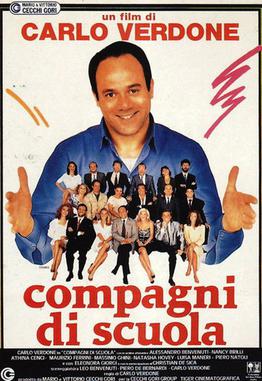
Compagni di scuola is a 1988 Italian comedy-drama film directed by and starring Carlo Verdone. It was shown as part of a retrospective on Italian comedy at the 67th Venice International Film Festival.
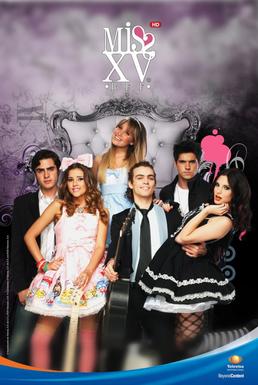
Miss XV, sometimes stylized as Miss 15, is a Mexican teen musical comedy-drama television series, it is loosely inspired on 1987 telenovela Quinceañera. Pedro Damián produced the series for Nickelodeon and Canal 5 in 2012.

Natasha Hovey is a Lebanese-Italian-French former film and television actress and a radio-hostess.

Elena Fabrizi, popularly known as sora Lella, was an Italian stage, television and film actress, and a television personality. She was both a Silver Ribbon and David di Donatello awardee, most prestigious Italian awards for a career in acting.

Stadio is an Italian pop rock band formed in 1977. The members are Giovanni Pezzoli (drums), Roberto Drovandi, Andrea Fornili (guitar), and Gaetano Curreri.

Elena Radonicich is an Italian actress.

Children of the Sea is a 2019 Japanese animated film directed by Ayumu Watanabe and produced by Eiko Tanaka, with animation production by Studio 4°C. It is based on the manga of the same title by Daisuke Igarashi, who also wrote the film's screenplay. It is Watanabe's first theatrically released film since Space Brothers #0 (2014), and the first animated film adaptation of an Igarashi manga. The film stars the voices of Mana Ashida, Hiiro Ishibashi and Seishū Uragami. Set by and in the ocean and themed on the mysteries of life, it depicts the connections between humanity and nature. It was released in Japan on June 7, 2019.
